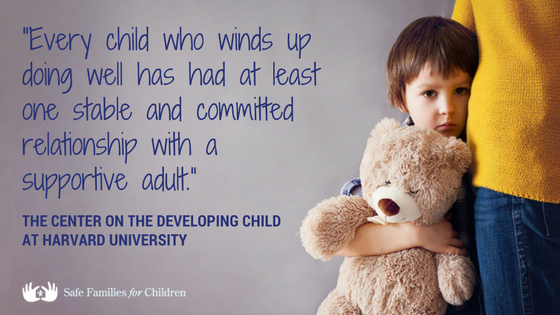In a culture that promotes independence and self-sufficiency, asking for help is often overwhelming. We may fear that asking for help makes us seem weak, incompetent, or needy. Or we may simply fear that we will be told ‘no’, and not want to bother another person.
It is a mistake, however, to equate needing help with weakness – especially when we consider the self-awareness and courage it can take to make a phone call. Every parent that reaches out to Safe Families asking for help with their children has dealt with fear, and has most certainly exhausted their other options for help! By calling, they show their strength as a parent in desiring the safety and well-being of their children above all else, and setting fear aside. Maybe they are new to the area, have lost family, or do not have reliable or safe people around them. Regardless of their individual situation, being willing to meet someone new and trust them with their most valuable possession (their own child) is bold, brave, and noteworthy.
At Safe Families PLUS, we are matching youth who are aging out of foster care with committed, caring adults to befriend them and be a safety net for them as they transition to adulthood. With every application we receive for a youth in care who is asking for a mentor, I am in awe of their willingness to ask for help. The majority are older teenagers living in residential group homes. They may have been in 20 different foster homes, lost contact with family, or been abused by the people who were supposed to protect them. Despite so many challenges, I am inspired that these youth are still reaching out, and are willing to try trusting an adult again.
“We lost our parents…”
“I try to stay out of trouble…”
“I could use a big sister to talk to…”
For youth who have not experienced the people around them as reliable, opening themselves up to a relationship with an adult is remarkable. And for teenagers who tend to think they have all the answers, wanting advice from an adult is unheard of!
There is no young person who is turned away from Safe Families PLUS because of behavioral issues, a delinquency history, or mental health needs. At Safe Families, we believe that no one is beyond help – and everyone has the potential to experience significant healing. We believe in a God of restoration and the preciousness of every person. We also believe that experiences of trauma can ultimately be transformed into a person’s greatest strength through resiliency, empathy for others, and the determination to overcome.
The Center on the Developing Child at Harvard University conducted research exploring this question of why some children who experience adversity end up doing well, and others struggle. Research continues to point to one common theme: the most significant factor that changes a youth’s outcomes is the presence of a stable, committed adult. Knowing that someone cares, and continues to show up for you, can change excruciating stress into hope.
Mentoring does not mean that you have to have all the answers, or special training in career planning. Many teenagers living in group homes have few opportunities to make decisions for themselves, or to plan how they would like to spend their time. They may be taken on field trips in a large group that are not interesting to them, or they may have multiple restrictions on their time. Simply having the opportunity to get out in a new setting, whether it is a grocery store or a park, can be impactful. We cannot underestimate the value of being present, showing up on time, being consistent, and creating a safe space to listen.
To learn more about Safe Families PLUS, click here.
by Kate Englund-Ginn, LCSW
Kate is the Program Director of Safe Families PLUS. This program equips mentors to walk alongside youth aging out of the foster care system. She also serves as the National Director of Research, Training, Scaling, and Innovation at Safe Families for Children.
Kate previously worked at an agency providing therapeutic case management to families and assisting them with adoption and guardianship services. Kate is passionate about helping children who have experienced trauma and supporting caregivers to strengthen and preserve the family unit.

